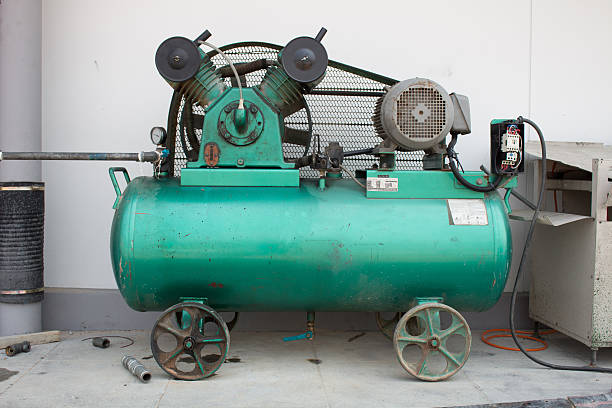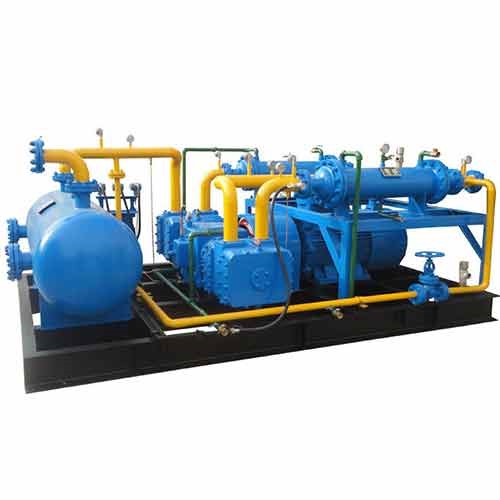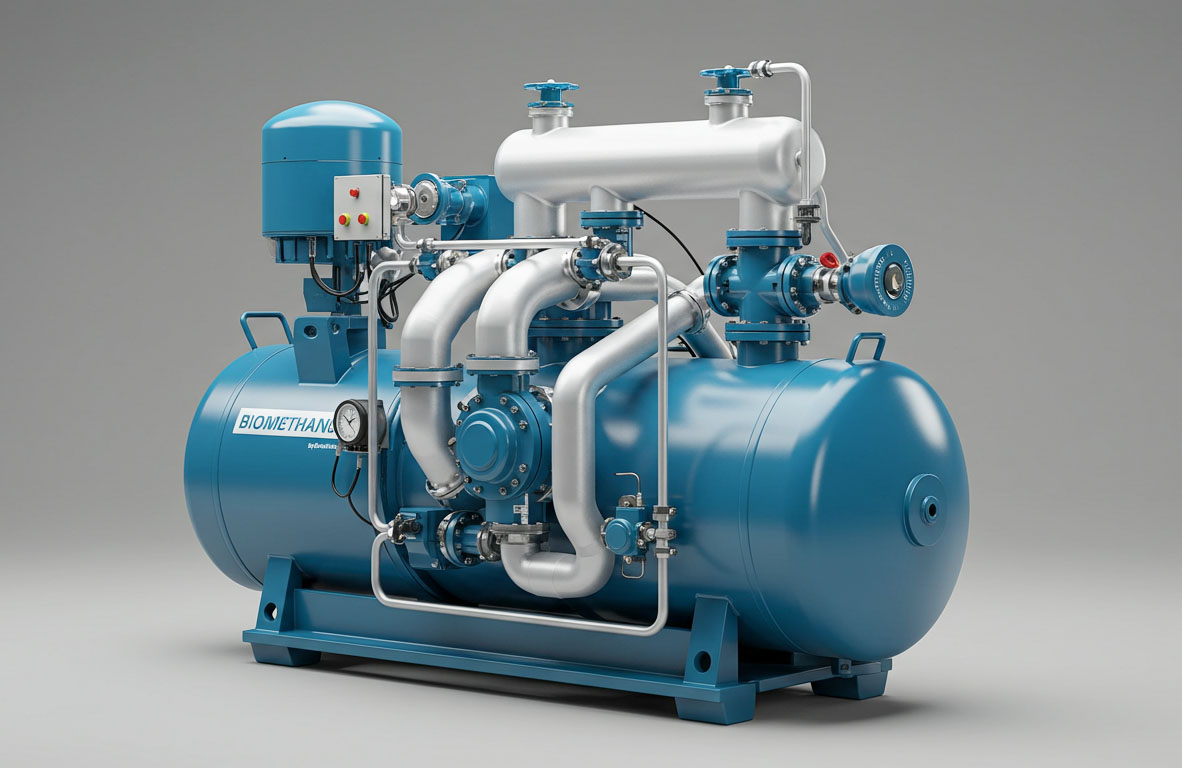How to Increase Piston Compressor Efficiency: Practical Strategies
Mastering Piston Compressor Efficiency: A Guide to Maximizing Performance and Saving Money:
Pneumatic tools, actuators, sophisticated machinery, and many other industrial processes all depend on compressed air to function. However, enormous power also entails huge responsibility—or, in this case, enormous energy consumption. This thorough article delves deeply into the topic of piston compressor efficiency, examining the many kinds, variables that impact it, and workable methods for enhancement.
But you may save your operating expenses and environmental impact dramatically by learning about and enhancing piston compressor performance. This post will provide you with the information and resources you need to maximize your compressed air system, regardless of whether you’re an experienced engineer or a company owner trying to save expenses.
What are the different types of piston compressor efficiency?
Have you ever wondered how much energy your piston compressor uses? The key to the solution is realizing the many forms of efficiency. The main actors are broken down as follows:
- Volumetric Efficiency:
Imagine a perfect seal forming between the cylinder and piston to achieve volumetric efficiency. The volumetric efficiency of your compressor indicates its proximity to this optimal value. This efficiency is decreased by leakage past pistons and valves, which affects the volume of air that is compressed.
- Isentropic Efficiency:
This is the gold standard of theoretical compression, meaning there is no heat loss and no friction. Although it is impossible in practice, it offers a standard by which to measure actual achievement.
- Polytropic Efficiency:
This is the real thing, forget about the frictionless paradise! The polytropic efficiency of your compressor represents its true efficiency, accounting for the heat transfer and friction that occur during compression. It’s the most useful way to assess the performance of your compressor.
- Mechanical Effectiveness:
This efficiency is limited to the mechanical parts, such as gears and bearings. It draws attention to internal energy losses in these components brought on by friction.
- Total Effectiveness:
With all of the above described efficiencies combined, this is the ultimate champion. It shows the compressor’s overall efficiency from the air entering to the compressed air leaving.
You can pinpoint places for development unique to your application by comprehending these various forms of efficiency. Your piston compressor can achieve notable performance increases by optimizing these factors.
How to improve piston compressor efficiency in manufacturing? Strategies to Supercharge Efficiency:
Is your pocketbook sobbing when your piston compressor is operating? Here are some doable tactics to increase productivity and make that scowl disappear:
- Variable Speed Drive (VSD):
Consider a VSD to be your compressor’s intelligent controller. It modifies the compressor speed in response to changes in the demand for air. This means that during times of low demand, you may save a lot of energy and keep your power expenses low.
- Two-Step Compression:
Envision compressing air twice, with an “intercooler” acting as a hero in between. This is what two-stage compression is all about. The temperature rise in each phase is decreased by splitting the compression operation into two steps, each with intercooling, which significantly increases total efficiency.
- Intercooling:
Recall the two-stage strategy’s intercooling hero. By eliminating the heat produced during each level of compression, it does its magic. This maintains the compressor running at a lower temperature, improving performance and lowering wear and tear.
- Synthetic Lubricants:
While lubrication is necessary, using traditional oils might make the problem of friction worse. The help of synthetic lubricants is evident! When compared to mineral oils, they provide better lubrication, reducing frictional energy losses and increasing efficiency.

Appropriate Maintenance Schedule:
Consider maintenance as a buffer against a drop in efficiency. Establishing a routine that includes leak checks, filter replacements, and oil changes can guarantee peak performance and prolong the life of your compressor.
You may increase the efficiency of your piston compressor by implementing these tactics. In addition to saving money on energy, you’ll prolong the life of your compressor and make operations more environmentally friendly. Both the environment and your pocketbook will benefit from it! For thorough maintenance instructions, view our extensive guide on piston compressor maintenance at our website.
The ROI of Efficiency: Saving Money and the Environment:
It’s not only about cutting down when it comes to your finances; investing in piston compressor efficiency is also an environmentally responsible choice. Encouraging efficiency provides a strong return on investment (ROI) for the following reasons:
- Lower Energy Costs:
A notable reduction in energy use is the main advantage right now. Your power rates will decrease significantly with a more efficient compressor since it uses less electricity. Just think of the benefits to your revenue!
- Longer Compressor Life:
Your compressor will endure less wear and tear if it runs well. Longer lifespans result from this, reducing the need for pricey replacements. In essence, you’re increasing the value of your investment by enhancing efficiency.
- Diminished Environmental Effect:
Remember to take care of the earth! A smaller carbon footprint is closely correlated with reduced energy use. You’re fighting climate change and fostering a more sustainable organization by putting efficiency first. Both the environment and your pocketbook will benefit!
Boosting Your Bottom Line and the Environment: Benefits of Piston Compressor Efficiency:
Enhancing your piston compressor’s efficiency can provide more than technical specifications; it can also lead to several real advantages for both the environment and your company. This is how putting efficiency first might result in a situation where everyone wins:
- Enhanced System Performance:
Efficiency gains have an impact on the system as a whole in addition to the compressor. Lower heat generation can enhance downstream processes and equipment, resulting in more efficient operation and possibly even higher-quality products.
- Decreased Maintenance Requirements:
A compressor with efficient operation often has less stress on its parts. This may result in less maintenance requirements, which would save costs and increase uptime.
Beyond only technical performance, you may reap several advantages by concentrating on piston compressor efficiency. In addition to lowering your energy costs and prolonging the life of your equipment, you’ll also be helping the environment. For any firm that uses compressed air, it’s a wise purchase.
Efficiency yields a return on investment that extends beyond simple cost reductions. It’s all about setting up a scenario where both the environment and your company benefit. You’re not just saving money when you invest in tactics that increase the efficiency of your piston compressor; you’re also choosing responsibly for a more environmentally friendly future.
Visit our website to browse our extensive selection of high-efficiency piston compressors and learn how you can save a ton of money and protect the environment!
Maintaining Peak Performance: Best Practices for Piston Compressor Efficiency:
A happy (and effective) compressor is a well-maintained piston compressor! The following best practices will help you maintain the smooth and effective operation of your compressor:
- Adopt a Regular Maintenance Schedule:
Create a thorough maintenance schedule and follow it scrupulously. This covers maintenance procedures such as oil changes, condensate drain inspections, and filter replacements for the air intake, oil, and discharge systems. Maintaining a consistent schedule guarantees peak performance and helps avoid efficiency degradation.
- Pay Attention to Your Leaks:
Air leaks kill efficiency! Use an ultrasonic leak detector or soapy water to check your compressor system for leaks regularly. Leaks may be quickly found and fixed to greatly increase efficiency and reduce energy waste costs.
- Remain Cooling:
Efficiency is hindered by heat. To provide sufficient heat dissipation, make sure the compressor’s surrounding area is well ventilated. To ensure that the intercooler (if provided) continues to remove heat effectively during compression, inspect and clean it frequently.
- Monitor Operating Conditions:
Pay attention to important operating factors such as oil level, temperature, and pressure. Deviations from suggested thresholds may impair effectiveness and reveal possible problems. Regularly keeping an eye on these metrics can help you spot issues early on and take action before they get worse.
- Select the Correct Lubricant:
Lubrication is necessary to lower wear and friction. Make use of the lubrication that the maker of your compressor suggests. When compared to conventional oils, synthetic lubricants can perform better, reducing friction and increasing efficiency.
Invest in Training:
Adequate training for operators has a significant impact. Teach your employees how to use compressors correctly and how to do basic maintenance. This can guarantee that the compressor is operating within its maximum efficiency range and assist prevent inadvertent overuse.
Maintain It Clean:
A happy compressor is kept clean! To keep dust and debris from getting inside the internal components of the compressor, clean its outside regularly. This contributes to overall efficiency by keeping cooling and airflow at their ideal levels.
Conclusion:
We at LEIYAO Compressor recognize the value of efficiency. Our extensive selection of high-efficiency piston compressors is engineered to provide outstanding performance while consuming the least amount of energy possible. Your perfect partner in compressed air system optimization is LEIYAO Compressor because of our dedication to efficiency and quality.


